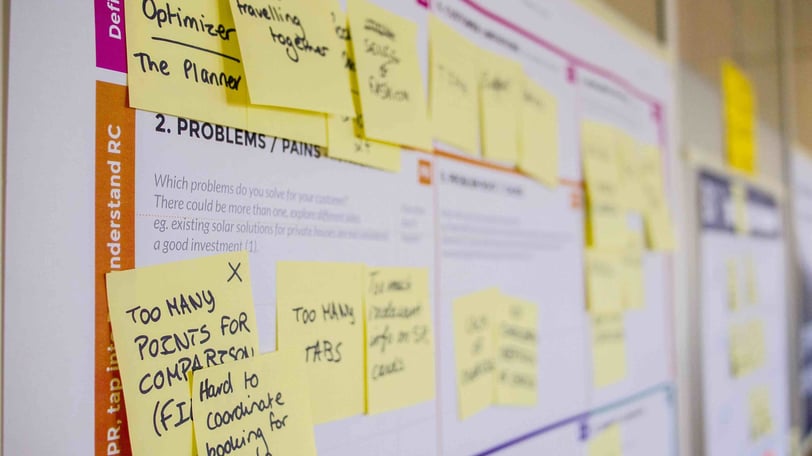Starting a Digital Project: Top Strategies to Maximize Your Business Idea's Potential in 2024
Repeating strategies without changes rarely yields better results. Instead of letting ideas stagnate, it's vital to investigate why they failed before and how to improve them. This article provides practical steps to validate your business idea, from researching the competition to talking with potential users. By following these steps, you can reduce risks and increase your chances of success in the competitive digital market.
STARTUPS
7/15/20243 min read


Repeating similar strategies in identical situations rarely leads to different outcomes; some might even consider it imprudent. Through accumulated experience, a shift in focus towards more effective idea evaluation has been learned. Instead of merely letting ideas "rest" on a Trello board, more time is now devoted to understanding why an idea has not succeeded in the past. The reflection centers on the fact that if it were so simple, why has it not been implemented before?
Experienced entrepreneurs and independent professionals agree that having an outstanding idea is only a part of the journey to business success. Throughout the journey, the importance of validating ideas before taking action has been understood. Lack of initial validation can result in building something that faces significant obstacles to success, as highlighted in stories of successful investors that seldom emphasize proper preparation.
Although proper preparation is seldom mentioned in success stories, the need to thoroughly understand the business idea before launching is acknowledged. This approach helps minimize the risk of failure and avoids ending up in the "Startup Cemetery." Below are steps to validate the feasibility of an idea, a process that will take no more than a day or two once the concept is understood. Additionally, valuable information will be gathered for the execution of the idea if the decision to move forward is made.
The importance of quickly validating your idea lies in addressing three key problems that can lead to early failure: scope, competition, and marketing. Underestimating the time needed to build a Minimum Viable Product (MVP) and get it operational is a common challenge. Knowing this time is essential to avoid setbacks. Subsequently, the challenge of competition arises, which must be addressed by checking the existence of competitors and associated legal issues. Even with a solid product, the importance of marketing is emphasized; it should not be assumed that customers will come on their own.
In summary, these uncertainties must be addressed before starting, and commercial validation is the first step to counteract them.
Steps to validate your business idea:
Idea Research:
Use brainstorming to describe the idea and search for related keywords.
Investigate on various platforms like Google, YouTube, Facebook, Quora, Twitter, Reddit, Upwork, Fiverr, PeoplePerHour, and the Kindle store on Amazon.
Examine platforms like ProductHunt, Kickstarter, Indiegogo, and GitHub for competitors and similar projects.
Competitor Analysis:
Use tools like Neil Patel, Buzzsumo, and domain name checkers.
Investigate competitors' performance and marketing strategies.
Research potential competitors.
Analyze their strengths, weaknesses, and market strategies.
Identify market gaps that your project could leverage.
Market Analysis:
Thoroughly research the market you are targeting.
Identify existing needs and problems that your project aims to address.
Examine trends and patterns that may influence the demand for your product or service.
Private Conversations about the Project Idea:
Speak with potential users, industry experts, bloggers, and other entrepreneurs.
Conduct interviews to gather feedback on the idea.
Ensure that the problem you are trying to solve is genuine and meaningful to your target audience.
Conduct interviews with potential users to understand their frustrations and needs.
Validate if there is real demand and if your solution aligns with market expectations.
Use of a Landing Page to Validate the Idea:
Design a simple landing page explaining the difficulty and the solution.
Publish the idea in specific communities, adapting personalized messages.
Offer visitors the option to leave their email if they are interested.
By following these steps, you will gain a better understanding of the viability of the idea and how to approach the market. It is important to remember that not all ideas are suitable for everyone, and it is acceptable to leave behind those that do not align with skills and resources.
Additionally, the importance of private conversations about the project is emphasized to reduce personal bias and obtain valuable information. Sharing the idea publicly through a landing page simplifies validation and prepares for the next development phase.
Exploring the Design Thinking methodology also emerges as an innovative alternative for validating projects through diverse stages. It commences with empathy, delving into user needs, followed by a clear definition of the problem to be addressed. The ideation phase fosters the generation of creative ideas, and prototyping transforms these ideas into tangible solutions. Subsequently, real-user testing provides valuable feedback, concluding with continuous iterations to refine and enhance the solutions. This user-centric and highly iterative approach ensures effective project validation while maintaining flexibility to adapt to the ever-changing needs of the business environment.
In conclusion, success begins with a solid idea, but validation acts as the bridge that leads to the other side, where execution meets excellence. Do not wait any longer to take the next step toward your entrepreneurial success.
Contact us today to schedule your free 45-minute consultation, and together, let's ensure your project takes off with strength! Make research and validation your allies in this exciting entrepreneurial journey!
hello@ideamultimedia.net
#MaximizeBusinessPotential #InnovativeValidation #DesignThinkingApproach #EmpathyInAction #UserCenteredValidation #EntrepreneurialInsights #IdeationProcess #PrototypeTesting #IterativeInnovation #BusinessStrategy #StartupSuccess #CreativeProblemSolving #MarketResearchInsights #UserFeedback #ProjectValidation #DesignThinkingJourney #BusinessIdeasValidation #IterateToExcel #EntrepreneurialMindset #SuccessInStartups #ResearchAndValidation #EntrepreneurialJourney #DesignThinkingValidation
